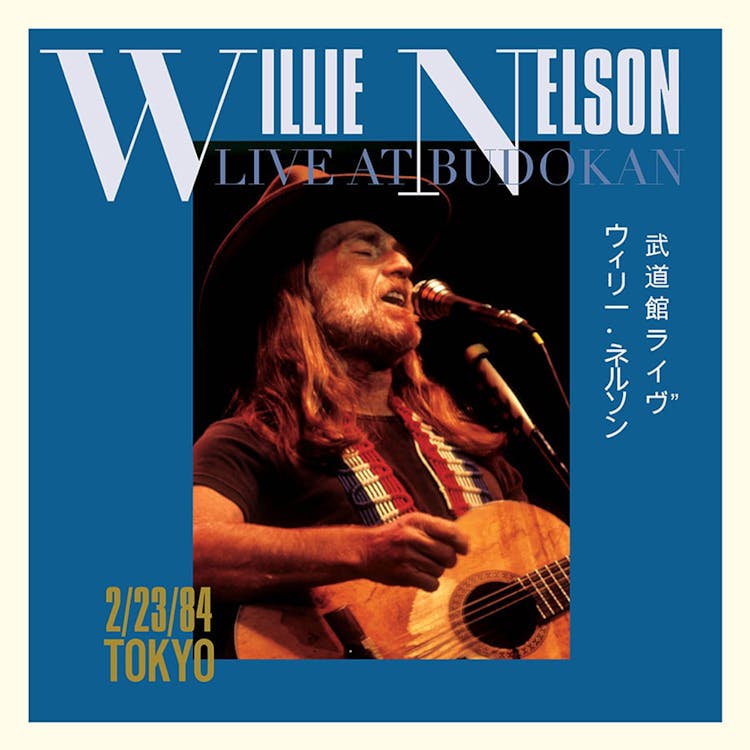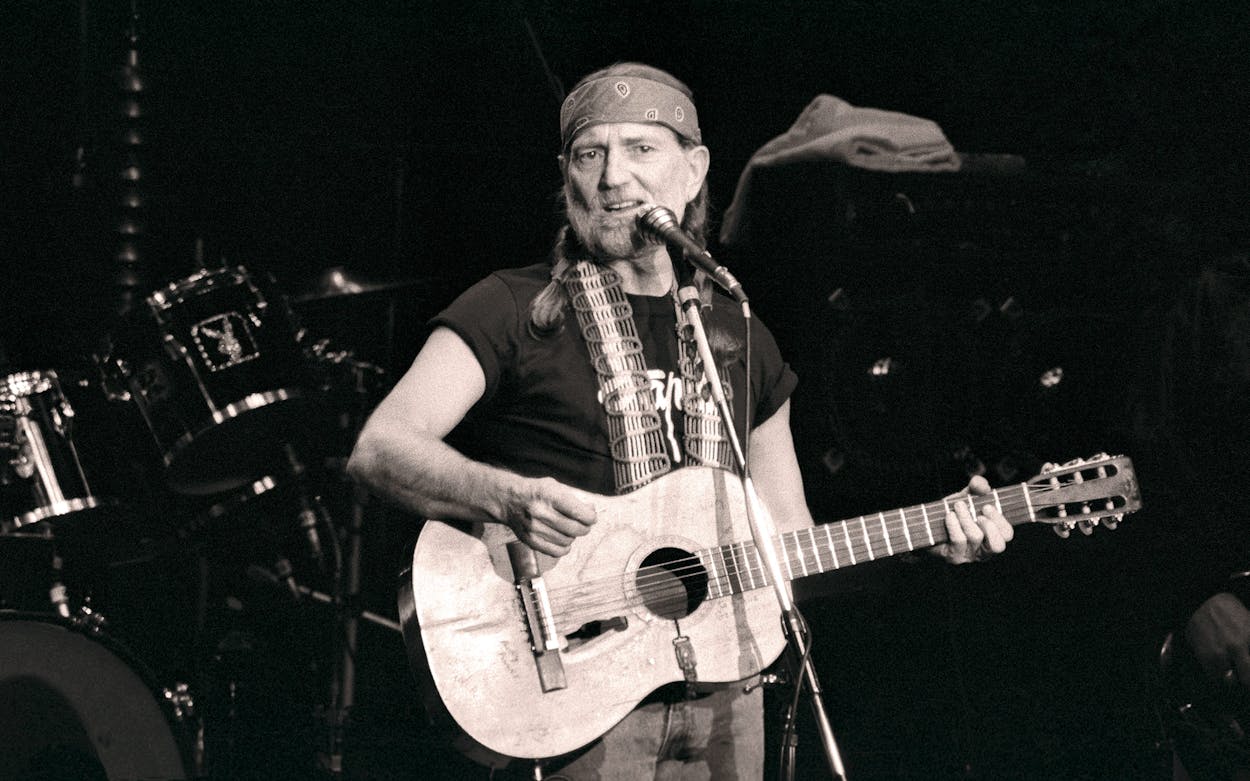When Willie finally broke big in the latter half of the seventies—first by taking the outlaw revolution nationwide with 1975’s Red Headed Stranger, then with the overwhelming success of 1978’s Stardust—longtime fans back in Texas had great fun telling people, “I told you so.” But then, in the early eighties, his star kept climbing to heights even Willie hadn’t imagined. He had a pop crossover hit with 1982’s “Always on My Mind,” which went to number five on the Billboard Hot 100 singles chart. Shortly thereafter came the global triumph of his 1984 duet with Julio Iglesias, “To All the Girls I’ve Loved Before,” which went top-five here and in such far-flung locales as Australia, Austria, South Africa, and Spain. And, finally, there was his solo vocal cameo in 1985’s dream-team fund-raising single, “We Are the World.” But nestled among those feats was an unlikely gig in Japan signaling that Willie’s reach was expanding into completely uncharted territory for a humble country singer.
On February 23, 1984, Willie played to a packed house at the Nippon Budokan, in Tokyo. A martial arts arena built for the 1964 Olympic Games, Budokan had become, by the early eighties, reliable shorthand for “rock stardom.” That reputation had been teased with the 1978 release in Japan of Bob Dylan at Budokan. It was set in stone a year later when Midwestern power-pop quartet Cheap Trick went from critic’s darling to chart-topper with Cheap Trick at Budokan, which was followed the next year by Eric Clapton’s live-from-Budokan album, Just One Night. When Willie booked his show there—with Columbia slated to record the performance for commercial release—it became clear that his true peers were no longer members of the Grand Ole Opry.

So maybe it was because he’d released his landmark Willie and Family Live album in late 1978, or, equally likely, because he’d flooded the market with an unheard-of seven albums in 1982, that Columbia decided to shelve Willie’s Budokan set. And there it sat, in the vault, for almost forty years, a mythical lost recording known only to stateside Willie nerds who’d found fuzzy VHS dupes of a laser disc issued solely in Japan. But now, finally, Sony’s Legacy Recordings is giving it a proper release as a two-disk CD set; a slightly abbreviated double LP on vinyl that will drop on Black Friday for Record Store Day; and a special video version that will begin airing on PBS the Saturday after Thanksgiving.
The record is essentially a time capsule, an exquisitely detailed snapshot of Willie and Family’s live show at a time when Willie was first becoming a worldwide, one-name celebrity. The track list is heavy on then-recent releases, some of which haven’t been in Willie’s set for decades. There are two songs from his then-current album, Without a Song, both the title track and “Harbor Lights.” There’s a four-track block from Stardust (“Blue Skies,” “Georgia on My Mind,” “All of Me,” and “Stardust”), three songs from 1979’s Willie Nelson Sings Kristofferson (“Help Me Make It Through the Night,” “Me and Bobby McGee,” and “Loving Her Was Easier (Than Anything I’ll Ever Do Again),” and two from 1980’s soundtrack to Honeysuckle Rose (“Angel Flying Too Close to the Ground” and “On the Road Again”). Notably, and possibly because he was now a big star himself, he did not play the medley of compositions (“Funny How Time Slips Away,” “Crazy,” and “Night Life”) first made famous by other singers.
But in other respects, the Tokyo show was altogether singular. It was Willie’s first trip to Japan, and the audience’s polite applause was nothing like the rowdy crowds heard on previous live records, a few noisy expats notwithstanding. Still, the unexpected throng of Japanese fans that had greeted his arrival at the Tokyo airport had already let him know he’d be appreciated. “I got a call at the hotel,” recalls Willie’s longtime harmonica player, Mickey Raphael, “that there was a guy in the lobby who wanted to say hello. It was a Japanese man in a ten-gallon hat—like a Hoss Cartwright hat—with toy guns in a holster and woolly chaps. I introduced myself and asked his name. He said, ‘Tex.’ I said, ‘Of course it is.’ ”
There was also the absence of weed. Paul McCartney had made international headlines four years earlier when he was caught with eight ounces of pot at Tokyo’s Narita International Airport and jailed. Disinclined to earn that kind of press or spend time in the pokey, Willie played the short Japanese tour with no smoke. Budokan may be the only known recording of Willie playing 100 percent straight.
His performance didn’t suffer. The hallmarks of a Willie show have always been the nuanced, improvisational tweaks to his singing and picking that keep the songs he plays night after night new to him, and he nailed those moves in Tokyo. They shine brightest on the chestnuts: the Kristofferson covers, the old standards from Stardust, and a strikingly souped-up version of “Will the Circle Be Unbroken.” Really, though, they’re evident throughout; with Trigger up front in the mix, the distinct call-and-response interplay between Willie’s vocals and his fretwork—what Raphael calls the key to his sound—are easier to appreciate here than on all but a few Willie records.
But to Raphael, who’s credited with producing Live at Budokan for release, the real revelation is the guitar of Grady Martin, the legendary Nashville session player who authored the iconic riffs and licks that drove classics such as Marty Robbins’s “El Paso” and Merle Haggard’s “Ramblin’ Fever.” In 1979, when Willie filmed concert scenes for Honeysuckle Rose, Martin sat in with the Family—onstage, but mostly off camera—picking the guitar parts that appeared to be played by Willie’s on-screen sidekick, Slim Pickens. Martin so enjoyed the experience that he simply stayed with the band, touring as an official member of the Family until 1994. His style was 180 degrees removed from Willie’s, subtle and precise where Willie’s was freewheeling and playful; hearing them trade solos was like hearing Glenn Gould and Thelonious Monk share a stage. “Grady pushed Willie just by being there,” says Raphael. “Hearing him each night made us all better players.
“I met Eric Clapton backstage at a show around that time,” Raphael continues. “I asked if he wanted to meet Willie. He said, ‘Sure. But can I meet Grady first?’ ”
Live at Budokan is an album that may be even easier to appreciate now than at the time. “We were young and firing on all cylinders,” says Raphael. “It’s a great showcase of what we sounded like in the eighties, which was a peak for us. It was a special period.
“If I was going to tell someone who’d never listened to Willie what records to start with, I’d tell them Teatro, Red Headed Stranger, and this one. For real.”
- More About:
- Music








